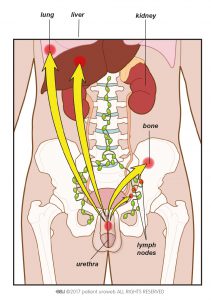Table of Contents [hide]
- 1 Localised urethral cancer
- 2 Treatment for men localised urethral cancer
- 3 Treatment for women localised urethral cancer
- 4 Locally advanced primary urethral cancer
- 5 Treatment of locally-advanced primary urethral cancer
- 6 Urothelial carcinoma of the prostate
- 7 Metastatic disease
- 8 Bone metastases
- 9 Deciding on treatment
Localised urethral cancer
Localised primary urethral cancer is confined to the urethra. Treatment for men and women differs.
Your doctor will recommend a treatment that aims to remove all cancer and preserve your quality of life. To do this, the location of the tumour is important.
Locally advanced primary urethral cancer
Advanced primary urethral cancer has grown into deeper layers of tissue, adjacent organs, or surrounding muscles. It has a higher chance of spreading to other parts of the body (metastatic disease) and is harder to treat.
Urothelial carcinoma of the prostate
Your doctor may recommend a urethra-sparing approach with transurethral resection of the prostate followed by chemotherapy if the cancer is non-invasive (Ta, T1).
In some cases, your doctor may recommend a cystoprostatectomy, which is a surgical procedure to remove your bladder, prostate and, in case your bladder and prostate contain cancer cells, an extended pelvic lymphadenectomy (removal of the lymph nodes in your pelvis).
Metastatic disease
If urethral cancer has spread to other parts of the body (Fig. 1), cure is unlikely. Treatment is limited to controlling the spread of the disease and reducing the symptoms.
Your doctor will recommend additional treatments such as radiotherapy and chemotherapy. Often, a multidisciplinary team of urologists, radiation oncologists, and oncologists will discuss your case to find the best possible treatment option for you.

Bone metastases
Urethral cancer can spread to your bones. If this happens, skeletal complications can occur, such as weakening of the bones and fractures. These complications cause pain and can negatively affect your quality of life. Your doctor may suggest drug treatment to help strengthen your bones and control the pain.
Deciding on treatment
If treatment is intended to slow down the cancer and control the symptoms, deciding what treatment is best for you—or whether to have treatment at all—can be difficult. You will need a clear understanding of what chemotherapy can do for you at this stage and how it will affect your quality of life.

